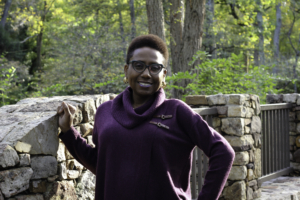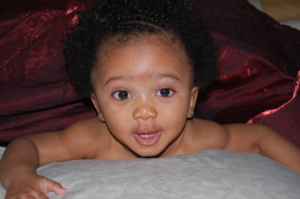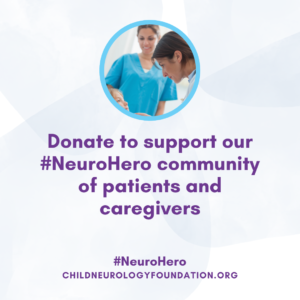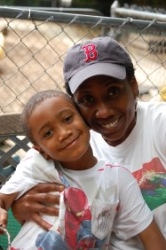In honor of Child Neurology Awareness Day on Oct. 29, we are sharing stories from the Neuro Heroes in our community. Learn more about Child Neurology Awareness Day and how you can become a #NeuroHero too.
She’s a mother to a 15-year-old with a neurologic condition, but Dr. Ereka Williams’ first introduction to the child neurology community actually came through her work, and not through her son.
As she neared the end of working towards her bachelor’s degree in elementary education, she took a part-time job working in a special needs childcare setting.

Ereka Williams went on to earn her Ph.D. in Curriculum Instruction with a focus on issues around equity and education.
“I realized that there is this whole community of children and families that need help,” she said. “In a K-12 education setting, kids are sort of viewed as individuals with these educational needs and plans, but during this time I realized that family support and care are a huge need in these children’s lives. And on top of that, there’s a niche of people of color who are not being adequately supported. This opened my eyes and really changed the trajectory of my career.”
Ereka went on to earn her Ph.D. in Curriculum Instruction with a focus on issues around equity and education.
At this point, she had a lot of experience with families with neurologic conditions, but once she became a mother to a son with a neurologic condition in 2008, everything changed.
“All my experiences with special needs kids had been through the lens of education,” she said. “But now, I was the parent who was walking this path. The one who was pregnant, had a scary ultrasound, met with a pediatric neurosurgeon, and has been holding my breath for 15 years wondering what might be around the corner for us.”
Ereka had seen warning signs of a neurologic condition during her third trimester of pregnancy. The doctors saw something concerning in the ultrasound but told her they wouldn’t know exactly what it was until after birth. Starting when he was 7 weeks old, he began seeing a pediatric neurosurgeon for period MRIs and development reviews. It was thanks to these early check-ins that she was able to receive a diagnosis so early in his life.

Ereka’s son at 6 months old.
Her son was diagnosed with agenesis of the corpus callosum (ACC), which is a rare birth defect that affects the brain. A person with ACC has a missing or partially missing corpus callosum, which is a thick bundle of nerve fibers that connects the right and left halves of the brain.
The check-ins with the neurosurgeon continued until he was about 3 years old, and at the time, since her son wasn’t presenting any significant symptoms, Ereka was told that her son was likely going to be just fine, that he was hitting his milestones, that they could live their life, and to come back if something didn’t seem right.
Has your pediatrician talked to you about the CDC’s updated milestone guides? Visit our blog for an overview of what’s changed.
Fast forward about 10 years, and Ereka witnesses her son’s first seizure.
“We were on our way to school one morning, and he started seizing in the back seat,” she said. “At first, I thought he was playing a joke because we can be a very comical family. But then he tried to get out of the moving car and that was a scary shock of reality for me, and that began our return to the neurologist.”
Ereka describes the next few years as trying to ‘chase the seizure,’ or trying to align an EEG test with a live seizure to find out what was really happening in her son’s brain. Only then could they set out on a treatment and med regimen.
And then, COVID hits, delaying every appointment and test by months and years. 
“The past three years have been long and hard,” Ereka said. “But thankfully last year we caught a seizure in real-time, which helped us understand which part of his brain the seizures were occurring in. This information was necessary for obtaining a seizure protocol and regimen.”
The seizure regimen has reduced her son’s frequency and severity of seizures, but they still need to be mindful of certain activities that could be dangerous for someone prone to seizures such as swimming or video games. And as an adolescent male – specifically a tall, adolescent, black male – her son is extra cognizant of what would happen if he has a seizure at school, with his friends, or out in public.
Throughout their journey, Ereka said that the greatest gift has been the epilepsy and child neurology community. Through the Child Neurology Foundation, she’s participated in the Family Support Program, and the Telehealth Satisfaction Survey, both of which helped her remember that there are other families out there with similar concerns and experiences.
Our Family Support Specialists have been where you are, and know what it’s like to have a child with a neurologic condition. Think Family Support can help you? Reach out to us here.

Ereka says when facing a neurologic condition, a sense of community is so important.
“A community to turn to helps tremendously,” she said. “When it’s 2 a.m. and you can’t get an appointment for at least a day, you can turn to this community and they can serve as a bridge of hope to just hold you over until you can see your doctor. That can mean everything during the tough moments.”
And for her son, being reminded that he’s not alone is sometimes what he needs to hear to keep his chin up.
“I am amazed at how he has trailblazed through this challenge so beautifully,” she said. “It can sometimes be a challenge to remind him that he’s not alone, but his resiliency and persistence to keep living his life are off the charts.”
Are you, or someone you know, a #NeuroHero? Share the story on social media to tell us about the #NeuroHero in your life. Be sure to use the hashtag and tag the Child Neurology Foundation in your post.
